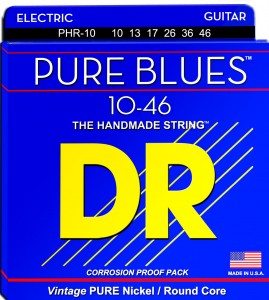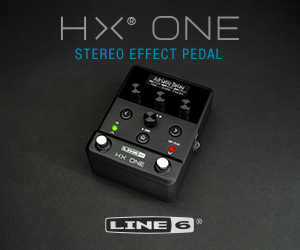What Can Nickel Do For You? How a Set of DR “Pure Blues” Strings Can Refresh Your Tone
trushack | Sep 20, 2015 | Comments 0
 TheToneKing.com readership was recently treated to an overview of several of the cool types of string that DR Strings, handmade strings that come straight outta Jersey, has out on the market. Whether it’s coated, luminescent, or sets with gauges specifically assembled for drop tuning, DR Strings has pretty much every string need a player could want covered.
TheToneKing.com readership was recently treated to an overview of several of the cool types of string that DR Strings, handmade strings that come straight outta Jersey, has out on the market. Whether it’s coated, luminescent, or sets with gauges specifically assembled for drop tuning, DR Strings has pretty much every string need a player could want covered.
While visiting the DR Strings both at Summer NAMM 2015, the folks at DR were kind enough to offer this writer a sample of their Pure Blues string set. DR Pure Blues strings are made much the way guitar strings were made back in the ’50s and ’60s, at the dawn of popular electric guitar music; the low E, A, and D strings start with a round core (vice hex core) and use pure nickel wrap wire, instead of the now-standard nickel-plated steel wrap usually installed on a hex-shaped core wire. As an occasional user of pure nickel strings that had not yet tried the Pure Blues set, I was excited to give them a try on Fender Jazzmaster I own that was suffering from a bit too much twang.
If you haven’t ever tried a set of pure nickel strings and or think all they’re good for is the Strat you use in your Buddy Holly tribute band, you’re missing out. Yes, pure nickel strings are certainly favored by players who are looking for clean and slightly dirty vintage-styled tones, but they also bring a lot to the table for those of us that enjoy cranking out gain-y, modern sounds. Below are a few of the things pure nickel strings bring to the table, regardless of the style you play.
Longer “Tonal” Life
This one admittedly depends on your tonal point of view. Fresh out of the pack, a set of pure nickel strings doesn’t have that over-the-top brightness that a set of nickel-plated steel or stainless steel strings might have. The DR Pure Blues have plenty of chime and sparkle, but it’s a bit more subtle and rounded and the overall tone is warmer, much like a set of broken-in nickel-plated strings.
As some of us have likely experienced in nickel-plated steel strings, one good practice session or gig can take all of the shine off a new set. Pure nickel strings aren’t as susceptible to this phenomenon, because there’s no nickel plating to wear off and all that high end is already dialed down. Thus, the change in tone isn’t as dramatic over time. For many players, particularly those who use products like the Roadie Rag to clean strings between sessions, this means fewer string changes and longer string life.
Potentially Less Fretwear Over Time
Pure nickel is softer than traditional steel, and definitely softer than stainless steel. Pure nickel wound strings simply won’t grind on your frets the way other materials do. Now, if you play hard and have a heavy fretting hand, divots in the windings on a pure nickel string may develop faster than with other materials. But it’s much easier and cheaper to change out a set of strings than get a re-fret done every couple of years.

Fatter, Smoother Tones
While the trend in strings seems to be moving towards materials that excite the pickup more than usual, pure nickel does pretty much the opposite. Nickel’s magnetic strength isn’t as great other materials used to make electric guitar strings, and that usually results in a smoother tone with less “cut.” This makes pure nickel strings a popular way to warm up electrics with single coil pickups. The occasional harshness of a bridge position single coil is reined in, while the richness and thump of a neck position single coil is accentuated.
Pure nickel strings can also have some cool results with high-gain pickups. A sizzling, high-output humbucker can easily be transformed into a Malcolm Young-approved gritty rhythm machine, and some clever tone and volume control manipulation and some picking dynamics can provide easier access to both rhythm and lead tones on a single pickup.
So how are those DR Pure Blues strings working out for me? In a word: fantastic. Even though I’m using an .011-.050 set on a 25.5″ scale guitar, the round core wire provides a very nice slinkiness that isn’t that far off of a traditional .010 set. They definitely tamped down the high end in a nice and natural way, leaving the articulate cleans that I love in place while giving overdriven tones an almost P90ish cut that works great for classic rock riffing. Adding an overdrive to the mix (in my case, a Boss OD-3) inflicted plenty of saturation and sustain to the signal, with no loss of edge or aggression.
Of course, pure nickel strings may not be the best option for certain styles or setups. Some people are even allergic to nickel, making the whole pure nickel thing a non-starter. But even if you don’t go the pure nickel route, DR Strings has lots of other great options to get you closer to the tone you’re looking for.
Tiny URL for this post:
Filed Under: Featured • Commentary / Editorials
About the Author:




















